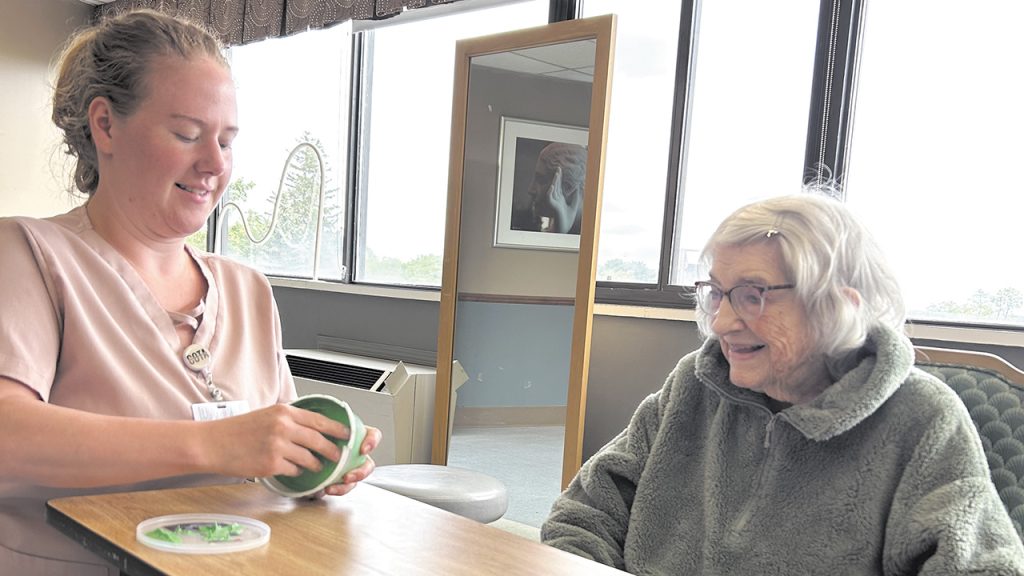CLINTON, N.Y. — Community Wellness Partners recently opened a new rehabilitation neighborhood on its Clinton campus, putting the finishing touches on a project started before the pandemic. “We recognized the fact that after COVID, people wanted privacy and private rooms,” Lenora D’Apice, chief strategy officer at Community Wellness Partners, says. Work to remodel the unit […]
Already an Subcriber? Log in
Get Instant Access to This Article
Become a Central New York Business Journal subscriber and get immediate access to all of our subscriber-only content and much more.
- Critical Central New York business news and analysis updated daily.
- Immediate access to all subscriber-only content on our website.
- Get a year's worth of the Print Edition of The Central New York Business Journal.
- Special Feature Publications such as the Book of Lists and Revitalize Greater Binghamton, Mohawk Valley, and Syracuse Magazines
Click here to purchase a paywall bypass link for this article.
CLINTON, N.Y. — Community Wellness Partners recently opened a new rehabilitation neighborhood on its Clinton campus, putting the finishing touches on a project started before the pandemic.
“We recognized the fact that after COVID, people wanted privacy and private rooms,” Lenora D’Apice, chief strategy officer at Community Wellness Partners, says.
Work to remodel the unit had begun before the pandemic, but Community Wellness Partners ultimately consolidated all residents into one building for efficiency and staffing purposes.
Now, with the pandemic in the past, the time was right to finish work on that unit — and add some new tweaks to the plan, D’Apice says.
That included using some available space adjacent to the atrium for therapy space, meaning patients can receive therapy right where they live.
“It just makes everything more convenient,” says D’Apice. It also makes it easy to integrate therapy into everyday routines while patients are there. Everything is located on one floor, making it accessible.
The focus is on short-term, intense therapy because Community Wellness Partners realizes that what patients most want is to return to their own homes, she says. Now they can receive that care in a modern, bright, welcoming facility.
“The environment they are in, that’s so important to their care physically and emotionally,” she notes.
Most of the work on the facility was already complete and included new flooring and upgraded rooms. Community Wellness Partners spent about a month completing some plumbing upgrades and adding finishing touches before the space was ready for patients, D’Apice says. The new section features 39 private rooms, shared living spaces, an atrium with skylights, and therapeutic services tailored to the needs of residents.
Along with serving as a bright and inviting space, D’Apice says the organization is considering adding elements of a therapy park to the atrium along the lines of “stations” like you might see at a community fitness park. It would be another way to make therapy accessible.
Community Wellness Partners care doesn’t just end with in-patient services as it is always looking to innovate care to meet the changing needs of the people served.
“Our home and community-based services is really a focus of ours right now,” D’Apice says, as the organization works to meet people where they are to provide the services they need.
The organization is also working to launch a new program called Program of All-Inclusive Care for the Elderly, or PACE for short.
The program would serve those who are qualified to live in a nursing home but wish to remain in their own home. It would combine a day program on the Community Wellness Partners campus with support at home at night. Within its service area, there are about 1,500 people who qualify for the program.
“It’s in our best interest to make sure people are well taken care of,” D’Apice says. “We’re committed to getting it off the ground and implementing it in our area. It’s definitely a need.”
Community Wellness Partners is a faith-based network of nonprofit organizations that support wellness through providing community services, housing, and health care. It is an affiliate of Lutheran Care.
The organization employs more than 800 people and provides services to over 1,300 older adults including home care, adult daycare, independent living, assisted living, rehabilitation, skilled nursing, and more.




